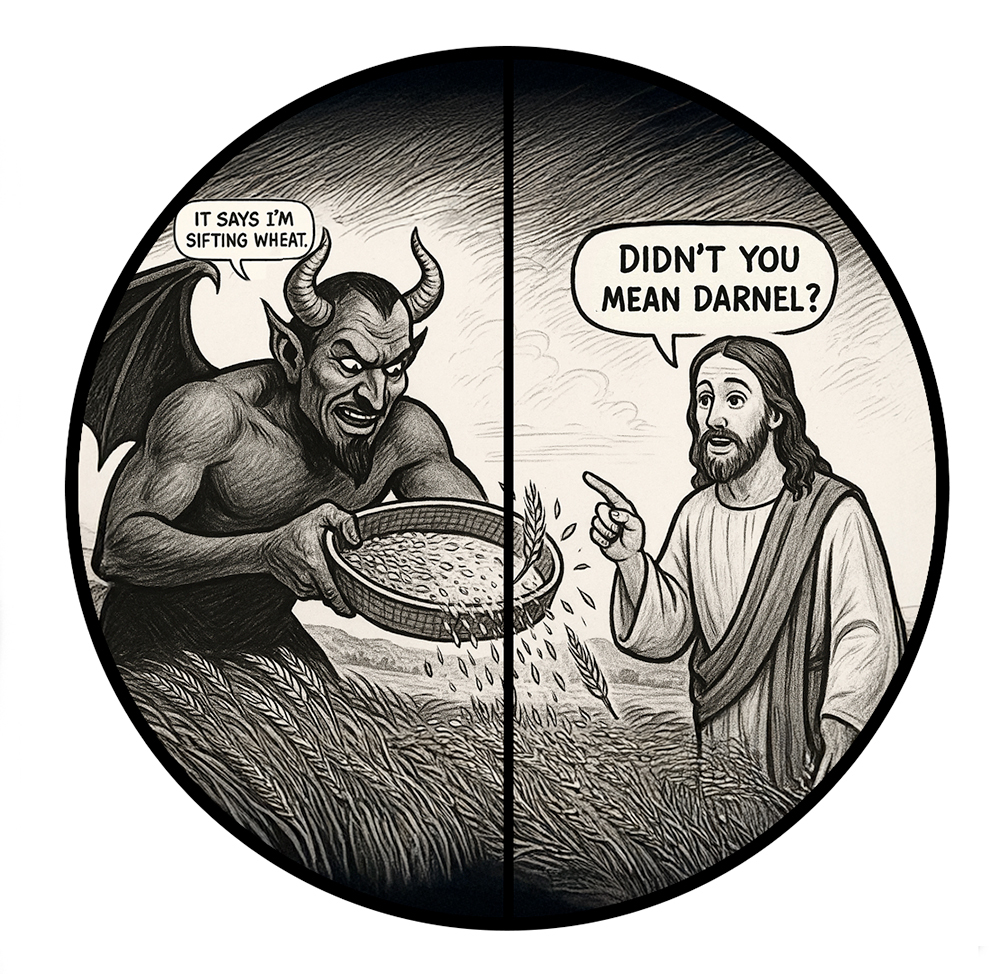 Luke 22:31
Luke 22:31

|
Strongs 4613
[list] Λογεῖον Perseus Simōn Σίμων Hearing N-VMS |
|
Strongs 4613
[list] Λογεῖον Perseus Simōn Σίμων Hearing N-VMS |
|
Strongs 2400
[list] Λογεῖον Perseus idou ἰδοὺ behold V-AMA-2S |
|
Strongs 3588
[list] Λογεῖον Perseus ho ὁ the Art-NMS |
|
Strongs 4567
[list] Λογεῖον Perseus Satanas Σατανᾶς Adversary N-NMS |
|
Strongs 1809
[list] Λογεῖον Perseus exētēsato ἐξῃτήσατο demanded to have V-AIM-3S |
|
Strongs 4771
[list] Λογεῖον Perseus hymas ὑμᾶς yourselves PPro-A2P |
|
Strongs 3588
[list] Λογεῖον Perseus tou τοῦ the Art-GNS |
|
Strongs 4617
[list] Λογεῖον Perseus siniasai σινιάσαι to mark/signal V-ANA |
|
Strongs 5613
[list] Λογεῖον Perseus hōs ὡς just like Adv |
|
Strongs 3588
[list] Λογεῖον Perseus ton τὸν the Art-AMS |
|
Strongs 4621
[list] Λογεῖον Perseus siton σῖτον wheat N-AMS |
Sown by the Adversary
Hearing, Hearing! behold! the Adversary demanded in order to mark yourselves just as the Wheat!75
"And within the Sleeping, the Hated One came upon the Men of himself, and he sowed darnels..."
(Matthew 13:25 RBT)And the Lord said, Simon, Simon, behold, Satan has demanded you, to sift as wheat:
And the Lord said, Simon, Simon, behold! Satan asked for you, to sift you as wheat;
“Simon, Simon, behold, Satan demanded to have you, that he might sift you like wheat,
Footnotes
| 75 | TL;DR
What? ἐξῃτήσατο ὑμᾶς τοῦ σινιάσαι ὡς τὸν σῖτον — This translation follows the Greek morphology and syntactic structure closely, refraining from interpretive metaphor. The verb ἐξῃτήσατο is the 3rd person singular aorist middle of ἐξαιτέομαι, meaning “to demand for oneself” or “to request intensely.” The object ὑμᾶς is accusative plural, indicating the group being requested. The construction τοῦ σινιάσαι is a genitive articular infinitive, common in Hellenistic Greek to indicate purpose or intended result. The infinitive σινιάσαι is the aorist active infinitive of the verb σινιάζω, a post-classical (not Attic or early Koine) verb that appears to derive from Latin signare, “to mark,” “to seal,” or “to signal.” Just not true. Though widely interpreted in ecclesiastical tradition as metaphorical “sifting” (a reading driven by the comparative clause ὡς τὸν σῖτον, "as the wheat"), there is no evidence in classical or Koine Greek that σινιάζω ever meant “to sift” in a literal or idiomatic sense. It is important to understand that the standard Greek verbs for "sift" or "winnow" would be λικμίζω (to winnow) or ἀνέμω (to toss grain). The meaning "sift" thus represents a contextual reinterpretation influenced by the wheat metaphor, not the semantic core of σινιάζω. Luke's choice of (rare) wording here is not inconsequential. With such a rare and unusual choice of wording, what leads a man to think it should be changed to a commonplace word? Theological Bias. The phrase ὡς τὸν σῖτον serves as a simile marking the manner or model of the intended action — “as the wheat”, i.e., just as wheat is marked (in threshing? gathering? ownership?), not sifted per se. Without imposing theological inference, the construction supports a literal reading: “He demanded you, with the intention to mark you, as the wheat.” This raises the possibility that the verse originally depicted a claim of dominion or possession, or perhaps a symbolic identification process, rather than a trial or purification (as "sifting" would suggest). After all, the Adversary sowed darnel/weeds, and is after domination, not merely testing, right? Sifting is a purification process— what is he doing sifting wheat, and not what he sowed? On the derivation of σινιάζω, see Georgacas, D.J. The Influence of Latin on Byzantine and Modern Greek, Byzantinische Zeitschrift, Vol. 45 (1952), pp. 337–344. See also Trapp, E. Lexikon zur byzantinischen Gräzität (LBG), where σινιάζω is attested only in later and vernacular sources with the meaning to signal or indicate, from Latin signare. The aorist infinitive σινιάσαι is regularly formed. Liddell-Scott-Jones (LSJ), A Greek-English Lexicon (9th ed.), s.v. σινιάζω: Glossed as equivalent to σήθω (to sift, winnow), attested in Luke 22:31 and later sources, including Hesychius, Photius, and various Byzantine glossaries. LSJ reflects the later semantic shift, where σινιάζω becomes associated with the verb for sifting grain due to the wheat metaphor used in the Gospel passage. The verb σινιάζω is attested in post-classical and Byzantine Greek, where it retains meanings such as “to signal” or “to mark,” in contrast to the more literal "sift" associated with σήθω and λικμίζω in earlier Greek. See Georgacas, D.J., The Influence of Latin on Byzantine and Modern Greek, Byzantinische Zeitschrift, Vol. 45 (1952), pp. 337–344, and Trapp, E., Lexikon zur byzantinischen Gräzität (LBG). The comparison of ὡς τὸν σῖτον ("as the wheat") in Luke 22:31 should be understood as a simile of identification rather than a description of a literal sifting process. The action of marking or signaling aligns with the idea of choosing or identifying wheat in a symbolic rather than a process-driven sense. |